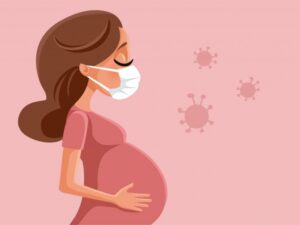You’ve spent months planning for your baby’s arrival, but now, something none of us could have predicted is now a part of our daily routine–staying safe and healthy during a global pandemic.
We’ve been washing our hands, practicing social distancing, and wearing face masks while we’re out grocery shopping. Our day-to-day life has certainly changed, but with those changes comes changes in the delivery room and routine check ups.
With the help of Amanda Lewis, APRN, CNM and Ryan Dickerson, MD, FACOG of Birth Center of Baton Rouge, we’ve found the answers to some of the most common questions you may have about COVID-19 and your pregnancy.
Is your partner allowed in the delivery room with you?
At the Birth Center of Baton Rouge, your partner and one other person–your mother, sister, or doula–are allowed as long as they are not showing any signs of illness: cough, fever, or other respiratory symptoms. At the local hospitals, one person is allowed in the delivery room.
Does becoming ill with COVID-19 increase risk of miscarriage or other complications?
Data is very limited, but according to the CDC, pregnant women are not at risk for miscarriage, but some recent studies have shown an increased risk of preterm labor.
What is the risk of passing it on to the baby?
According to Harvard Health Publishing at Harvard Medical School, there is very little data so far, but there is little risk of transmission to the baby. A study of nine pregnant women who were infected with COVID-19 and had symptoms showed that none of their babies were affected by the virus. The virus was not present in amniotic fluid, the babies’ throats, or in breast milk. Another study of 38 women infected with COVID-19 found that none of the newborns tested positive for the disease. Two case reports of infants born to mothers infected with SARS-CoV-2 demonstrated that the infants had elevated levels of antibodies to the virus but did not demonstrate any clinical evidence of infection with the virus. Another case report analyzing 33 pregnant women infected with SARS-CoV-2 found that three of their newborns were also infected with the virus and had clinical signs of infection, as well as confirmation of COVID-19 infection. It is unclear whether these newborns were infected while in the womb or if these infections were acquired after birth, as the newborns were tested when they were days old. The possibility of vertical transmission (passing the virus from mother to baby) has not been ruled out.
Should moms continue going to prenatal visits? Should they expect changes?
There are certain visits that moms will need to attend, the initial visit, ultrasound or lab visits and other important visits during the pregnancy. Each office in the area has instituted telehealth as a way for moms to stay connected with their providers but decrease the risk of going into the office with many other people. We are still seeing moms if there are any problems with the pregnancy, but if all is well, she will be able to stay home and continue social distancing for many of her visits.
After delivery, will they still be able to stay at the hospital?
At the Birth Center of Baton Rouge, moms stay at the birth center for 6-12 hours after the birth before going home. During normal times, we go to their home to check on them within 24-48 hours of the birth and see them again one week and six weeks after the birth. During this time, we offer to see them in the office at 24-48 hours or just have a phone call follow up. In the local hospitals, many doctors are allowing early discharges to let moms and their new babies go home as soon as possible to decrease their risk. This is individually based on the hospital, doctor, and your overall health after the birth.
Will visitors be allowed?
At this time, no visitors are allowed at the hospitals or the Birth Center in order to maintain social distancing.
If a mom tests positive for COVID-19, will she still be able to breastfeed?
There is no evidence of COVID-19 in breastmilk, but there is conflicting data about this topic. According to the World Health Organization, mothers should continue to breastfeed and maintain respiratory hygiene during feeding, wearing a mask where available. Wash hands before and after touching the baby and routinely clean and disinfect surfaces they have touched. According to the American College of Obstetrics and Gynecologists (ACOG) the primary concern is not whether the virus can be transmitted through breast milk, but rather whether an infected mother can transmit the virus through respiratory droplets during the period of breastfeeding. A mother with confirmed COVID-19, or who is asymptomatic, should take all possible precautions to avoid spreading the virus to her infant, including washing her hands before touching the infant and wearing a face mask, if possible, while breastfeeding. If expressing breast milk with a manual or electric breast pump, the mother should wash her hands before touching any pump or bottle parts and follow recommendations for proper pump cleaning after each use. If possible, consider having someone who is well feed the expressed breast milk to the infant. Some hospitals require that you be separated from the baby and use a breast pump to express your milk then have someone who is not sick bottle feed the baby. Moms would need to check with their hospitals to find out their policy on breastfeeding if COVID-19 positive.
Will the delivery room staff be limited?
At the Birth Center of Baton Rouge, we will have two staff members present for each birth as always.
Will everyone be required to wear masks and protective clothing?
At this time, everyone in the room is required to wear a mask when healthcare providers are in the room. We are not requiring special protective clothing for women in labor or their partners at this time.





